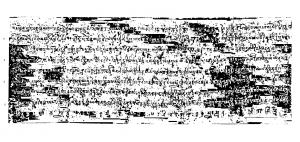
May that very long banner of (the god) Śûlapâṇi destroy the glory of your enemies; —(that banner) which bears (a representation of) the bull (Nandi), marked by the five fingers (dipped in some dye and then) placed on him by (Pârvatî) the daughter of the mountain (Himâlaya), who causes the distant regions, in which the demons are driven wild with fear by (his) terrible bellowings, to shake; (and) who makes the glens of (the mountain) Sumêru to have their rocks split open by the blows of his horns!
(Line 2.)—He, to whose arm, as if (to the arm) of (the god) Śârngapâṇi,—the fore-arm of which is marked with callous parts caused by the hard string of (his) bow, (and) which is steadfast in the successful carrying out of vows for the benefit of mankind,—the earth betook itself (for succour), when it was afflicted by kings of the present age, who manifested pride; who were cruel through want of proper training; who, from delusion, transgressed the path of good conduct; (and) who were destitute of virtuous delights:—
(L.3.)— He who, in this age which is the ravisher of good behavior, through the action simply of (his good) intentions shone gloriously, not associating with other kings who adopted a reprehensible course of conduct,—just as an offering of flowers (is beautiful when it is not laid down) in the dust;—he in whom, possessed of a wealth of virtue, (and so) falling but little short of Manu and Bharata and Alarka and Mândhârti, the title of “universal sovereign” shines more (than in any other), like a resplendent jewel (set) in good gold:—
(L.4.)—He who, spurning (the confinement of) the boundaries of his own house, enjoys those countries,—thickly covered over with deserts and mountains and trees and thickets and rivers and strong-armed heroes, (and) having (their) kings assaulted by (his) prowess,—which were not enjoyed (even) by the lords of the Guptas, whose prowess was displayed by invading the whole (reminder of the) earth, (and) which the command of the chiefs of the Hûṇas, that established itself on the tiaras of (many) kings, failed to penetrate:—
(L.5.)—He before whose feet chieftains, having (their) arrogance removed by the strength of (his) arm bow down, from the neighbourhood of the (river) Lauhitya up to (the mountain) Mahêndra, the lands at the foot of which are impenetrable through the gloves of palmyra-trees, (and) from (Himâlaya) the mountain of snow, the table-lands of which are embraced by the (river) Gangâ, up to the Western Ocean,—by which (all) the divisions of the earth are made of various hues through the intermingling of the rays of the jewels in the locks of hair on the tops of (their) heads:—
(L.6.)—He by whom (his) head has never been brought into the humility of obeisance to any other save (the god) Sthâṇu;—he, through the embraces of whose arms (Himâlaya) the mountain of snow carries no longer the pride of the title of being a place that is difficult of access;—he to whose two feet respect was paid, with complementary presents of the flowers from the lock of hair on the top of (his) head by even that (famous) king Mihirakula, whose forehead was pained through being bent low down by the strength of (his) arm in (the act of compelling) obeisance:—
(L.7.)—By him, the king, the glorious Yaśôdharman, the firm beams of whose arms are as charming as pillars, this column, which shall endure to the time of the destruction of the world, has been erected here,—as if to measure out the earth; as if to enumerate on high the multitude of the heavenly lights; (and) as if to point out the path of his own fame to the skies above, acquired by good actions;—(this column) which shines refulgent, as if it were a lofty arm of the earth, raised up in joy to write upon the surface of the moon the excellence of the virtues of Yaśôdharman, to the effect that—“His birth (is) in a lineage that is worthy to be eulogised; there is seen in him a charming behaviour that is destructive of sin; he is the abode of religion; (and) the (good) customs of mankind continue current, unimpeded (in any way) by him.”
(L.9.)—From a desire thus to praise this king, of meritorious actions, (these) verses have been composed by Vâsula, the son of Kakka. (This eulogy) has been engraved by Gôvinda.